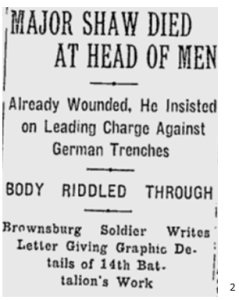Saturday, June 12, 1915
Rest Billets, Bethune
The Battalion War Diarist wrote nothing for day: [1]
THIS DAY IN RMR HISTORY: The Gazette, of Montreal, on June 12th 1915, carried another letter from a member of the 14th Battalion then serving at the front.
 “Writing to Mr. W.S. Coles [sic] of Lachute, Private Henry Mack of Brownsburg gives some interesting details of the operations of the 14th Battalion. He writes in part:
“Writing to Mr. W.S. Coles [sic] of Lachute, Private Henry Mack of Brownsburg gives some interesting details of the operations of the 14th Battalion. He writes in part:
‘When we arrived in this country we landed not at Havre as expected, but at St. Nazaire and had five days and nights train ride to the north of France. Our first experience of trenches was at Armentieres, where there is a large asylum of some 400 inmates. When the Germans turned them all loose at the beginning of the war the British drove them out. We were only 45 yards from the Germans at this spot, which was opposite to the large town of Lille and the latter still occupy this place. We did six nights in the trenches there and got christened with fire, then were marched to Aubers on the left of Neuve Chapelle, where we relieved England’s crack regiment of Guards, a fine body of men. Here we did good service and were then engaged in the battle of Neuve Chapelle. After ten days we were marched to Flanders and after that General Dorrien gave us a little praise, saying we would get the better at the next place, and so we did. Marching to Ypres, we took over the trenches from the French, but next morning got a surprise for we were only 25 yards from German trenches and there were piles of corpses lying between us and them. Our officers at once got us to work on new dug-outs, but everywhere you unearthed bodies and the sun was so strong you can guess it was not nice. Well we did five nights and days there until the 5th Highlanders of Montreal relieved us. They are the 13th battalion. We then went to billets in St. Jean about two miles from St. Julien where we spent one night resting and next day at four o’clock when coming from the trenches we met a party of shouting Germans who were repulsed by a number of French officers. They left their rifles behind and ran. I dressed two for their shots but a lot were moaning in pain from gas poisoning. I shall never forget the boys all singing as they marched to St. Julien. In the meantime our gallant 5th Highlanders still held three trenches in spite of the gas. The Germans were … we went to their rescue and advanced against a bush where the enemy were concealed with their maxims and that is where we had casualties, although their marksmanship was very bad. We could feel the wind from their bullets over our heads, and when they altered the range the ground was being kicked up.
Major Shaw’s Heroism: We are now at a place where the English have driven through, and we have been advancing all the time. We came out Saturday night, May 22nd, after five days under heavy fire. We had 85 casualties, including Majors Warminton and Shaw. Major Warminton was just resting in his dugout when a shell burst, killing him in his sleep. He was a grand man and one for whom his men had the keenest regard. Major Shaw was wounded in the head with a bullet and it was while we were taking another two lines of trenches from the Germans that he insisted in going with us and rushing the Germans. The next morning we found his body riddled through and through. We are now resting for four days, but advance is still going on. Last night, May 22nd, the 16th Batt. Canadians took 800 yards, and the Ghurkas advanced on their left taking 1,000 yards.
It has just poured with rain for the last 3 days, but today the sun is shining and all seems happy. Our casualties are heavy, but it is a great piece of work the English army did here. The Germans thought they were not to be moved. Their 3-line trench was built of concrete and lots of gallant Guards fell before the trench was taken…’” [3]
[1] War Diary, 14th Canadian Battalion, The Royal Montreal Regiment, June 12, 1915. Library and Archives Canada, Ottawa http://data2.collectionscanada.ca/e/e044/e001089758.jpg
[2] “Major Shaw Died At Head Of Men,” The Gazette, Montreal, Quebec, Saturday, June 12, 1915, pg. 3, col. 3.
[3] Ibid

